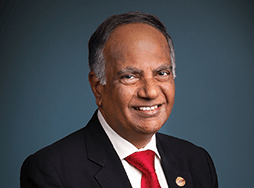
The journey to a Ph.D. is filled with long nights, intense debate, and constant doubts over the question “Can I do this?” Thankfully, Toastmasters helped me answer with a resounding yes! Ten years later I have my Ph.D. and an Accredited Speaker designation and am confident as an expert in the fields of motivation, mindset, and work-life balance. Toastmasters played a crucial part in that success.
In 2010 I walked into a small conference room in Erickson Hall at Michigan State University for my first Toastmasters meeting as a guest. Susan was the first Toastmaster I met, and she asked me why I wanted to join. I replied, “I overcame a physical disability to play college football. I want to use that story to motivate others to achieve their dreams, just like my hero Jim Abbott (a one-handed Major League Baseball player).”
As I reflected on this journey, I discovered five ways Toastmasters helped me (and can help Ph.D. students) to be successful.
1 Find an “academic voice.”
My club was where I practiced academic presentations and gained confidence speaking on academic topics. Learning to speak as a scholar or expert can be frightening. Doctoral students are expected to be familiar with academic reading and writing but are rarely taught to verbally communicate or present. This can be intimidating for those who teach classes and present research at conferences. Toastmasters provides ample opportunities to practice expressing your thoughts and develop a strong, confident academic voice.
2 Find an “expert voice.”
Expert voice refers to the ability to communicate your research in a way a general audience can understand. Developing my expert voice happened by chance during Table Topics®. I was asked to give an analogy to explain my research, which was on how people’s preferences and abilities to set boundaries affect their job satisfaction. To best describe work-life balance, I thought of a dinner plate at a buffet. Some people go to a buffet and make sure that the food on the plate does not touch, while others pile and mix food. Neither is wrong, but understanding which we prefer is vital in bringing about work-life balance. Two minutes and 31 seconds later, I had the beginning of an analogy that I still use today.
3 Develop leadership skills.
Prior to earning my Ph.D., I was the director of university housing. I had a large staff and managed multimillion-dollar facilities. Being a graduate student meant I had to give up that leadership role. Toastmasters became a venue where I could continue to improve my leadership skills by working in a positive, team-based environment. The excellent training from Toastmasters Leadership Institutes also added to my skill set. I eventually served as Club President with six other club officers who were also Ph.D. students.
4 Gain an international perspective.
Fifty percent of the members in my club were international. This was beneficial in two ways. First, I became more selective of the language I used and aware of words that are common to American audiences but might cause confusion to those from other backgrounds. Second, the international perspective improved my research knowledge. My fellow Toastmasters were keen to share their cultural perspectives on work-life balance as well as insights on laws, systems, and practices employed in their home countries. My interactions inspired me to incorporate an international human resources course into my study plan. I became a stronger scholar because of this dynamic.
5 Discover stress relief and community.
The deadlines and competitiveness of a doctoral education can be toxic. Toastmasters provided a place to unwind, laugh, and relax. My favorite speech I ever delivered was based on the idea that Santa Claus was a Canadian citizen. It was silly, but that silliness helped me get through a very stressful first semester. My involvement in Toastmasters also led to long-lasting friendships that helped me get through challenges.
December 2019: I walked into a small conference room in Erickson Hall to defend my dissertation. Susan was my guest that day. When my defense was completed, she handed me a beautiful gift: a Jim Abbott autographed baseball. As a gift to myself, I had a special championship belt created to commemorate my academic journey. Every image represents an ally that helped me graduate. Toastmasters was represented by the Accredited Speaker logo—a designation I earned in 2019.
In the case of Ph.D. students, Toastmasters has the power to create well-rounded, well-spoken, confident scholars. Trust me, I have the belt to prove it.
Paul Artale, DTM, AS is an Accredited Speaker and member of Grand Blanc Area Toastmasters Club in Grand Blanc, Michigan. He completed his Ph.D. in Higher Education at Michigan State University in April 2020. Learn more at www.paulartale.com.



 Previous
Previous
 Previous Article
Previous Article

